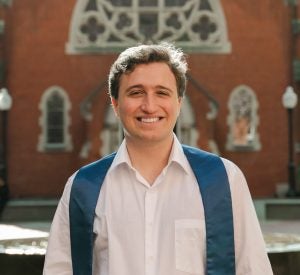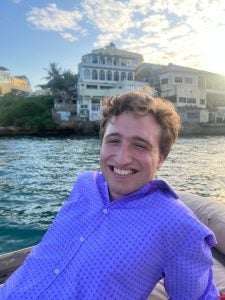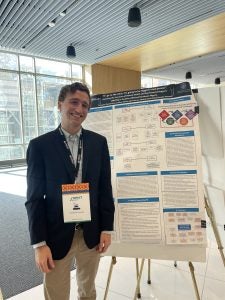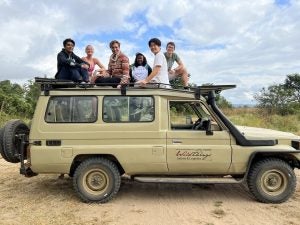
Over his four years at Georgetown, Ben Oestericher (SFS’25) has never shied away from embracing his passions. As a regional and comparative studies (RCST) major, Oestericher has pursued his interest in sub-Saharan Africa and economic development through a variety of different experiences in the classroom, on campus, across DC and around the world. Along the way, he’s made sure to maintain a vibrant presence within the Hilltop community.
Blazing his own academic path
The most impactful day of Oestericher’s Proseminar—Migration in and from Africa, taught by Professor Lahra Smith—was actually when it was cancelled. He had long admired then-USAID Administrator Samantha Power for her work on international development and atrocity prevention, so he was dismayed when he realized that a talk she was delivering to the SFS community overlapped with his class meeting. After reaching out to Smith, she quickly cancelled class and encouraged her students to attend.

“Even though I was just a month into Georgetown, I garnered the bravery to raise my hand and ask a tough question,” Oestericher recalls, adding that he came away “starstruck” having experienced an “only at Georgetown” moment that left him deeply interested in economic development and public service.
After that, his academic journey was set. Oestericher’s classes and professors continued to be critical to furthering his interests in international development. In particular, Professor Emily Mendenhall’s class on global hunger challenged many of his preconceived notions and helped him understand the root causes and connections that lie behind issues like hunger and poverty.
Toward the end of that class, Mendenhall offered him the opportunity to visit Kilifi County, Kenya, to conduct summer field research on the link between the climate crisis and mental health: “This experience of interviewing those on the frontlines of climate change, through Professor Mendenhall’s mentorship, made me understand the importance of listening to local voices and understanding local cultural contexts when designing development projects.”
After these formative courses, Oestericher was drawn to the RCST major, encouraged to explore his dual interests in sub-Saharan Africa and international economic development, a flexibility that this unique major could afford.
“I love that the RCST major is self-designed, allowing me to shape my own focus and concentration. In concentrating on the Peace-Humanitarian-Development nexus in Africa, I was able to take classes across departments and schools on topics ranging from technology to conflict to economic development,” Oestericher says.
Hands-on learning across the African continent
Oestericher has complemented his studies with real-world experience beyond the campus gates. He interned in the U.S. Department of State’s Africa Bureau, working on public diplomacy campaigns across the continent. He went on to hold internships across several sectors, including at USAID, Mercy Corps and the U.S. Institute of Peace.

Yet Oestericher’s fieldwork across the African continent proved just as critical. He spent one summer with a group of SFS students on a program in Tanzania, led by Professor Ken Opalo. Opalo helped the students explore Tanzania’s complicated history through colonization, independence and development in the modern era.
“Professor Opalo challenged me to unlearn assumptions in my international development coursework—namely, that democracy was a prerequisite for development and that development trajectories should adopt certain Western models,” Oestericher says.
Oestericher continued his experiences abroad with a semester in Cameroon. This time, he was able to conduct a wide range of inquiries on his own, including a special focus on the country’s Anglophone crisis. While conducting thesis research in Cameroon, he interacted with everyone from government officials to rebel leaders and everyday citizens, helping develop his interests in civics and local economies.
Applying international perspectives
Informed by his time on the ground in Cameroon, Kenya and Tanzania, pooling together perspectives from different walks of life emerged as a key point of focus for Oestericher’s on-campus engagements. A long-time member of the Georgetown Bipartisan Coalition, Oestericher became the organization’s director of on-campus operations and aimed to instill those lessons into the campus community. This included helping to foster a dialogue shortly after the October 7 Hamas attacks in Israel, planning events in conjunction with SFS departments to platform a diverse array of voices on the conflict in the Middle East.

But perhaps his most rigorous on-campus commitment has been serving as president of the GU Eating Society (GUES), which helped him channel his passion for food and its intersections with complex local and international issues. Through GUES, he’s had the opportunity to visit countless restaurants and food-related nonprofits in the DC area and interact with their diverse owners and employees. In many ways, this was a culmination of the experience he’d gleaned delving into food security and nutrition in the classroom and while abroad.
If there is one thing Oestricher would tell incoming undergraduate students, it’s, “Say yes to everything. The four years will fly by, so take every potential opportunity to go to that talk, do that research project, join that club, or study abroad,” he says.
A future path carved by lessons as a Hoya
As he looks ahead, Oestericher is prepared to deploy his experience on development, sustainability and security while focusing on Africa policy. Through the Princeton in Africa Fellowship, he will be embarking on a one-year job placement in Nairobi, Kenya, with the International Rescue Committee, work that will span the peace-humanitarian-development nexus.

He’d like to continue working with the African private sector and groups that deepen U.S.-Africa ties, with an eye on spending as much time as he can working on the continent: “I aim to do so through work on the African continent, but I would like to eventually take what I learn into the government to support a vision for U.S.-Africa policy that builds win-win mutual partnerships among the United States and African governments, civil society and people.”